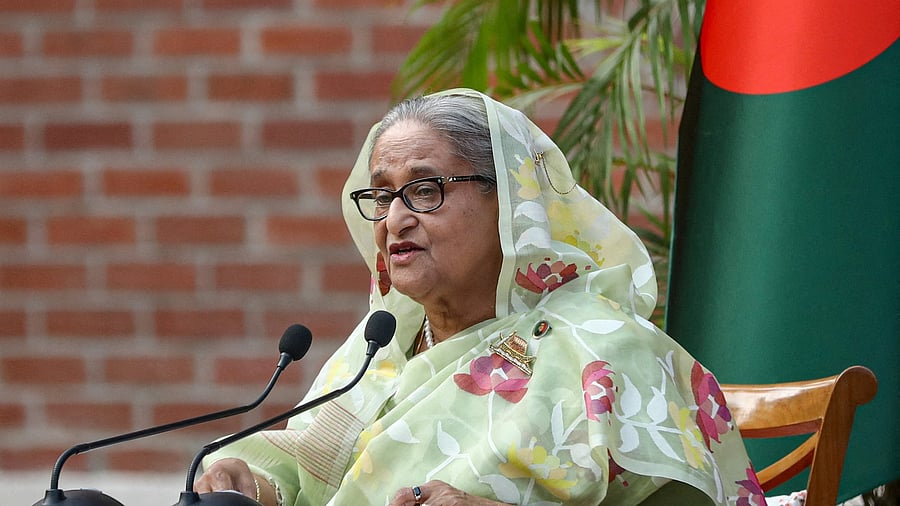
Sheikh Hasina Chairperson of Bangladesh Awami League.
Credit: Reuters File Photo
Bangladesh's politics have been marked by turbulence over the past five decades, from mass sacrifices for democracy to confrontational politics. The country has witnessed 12 Jatiya Sangsad elections, most of which have been contested or rejected by opposition parties. Coups, counter-coups, assassinations, and military rule have led to belligerent politics and electoral violence. Intolerance towards opposition parties has become dominant in the political discourse, contributing to intra-party authoritarianism and nepotism.
The interim government led by Mohammad Yunus has made the controversial decision to revoke the Awami League’s (AL) registration under Section 90B of the Representation of the People Order. Adviser Asif Nazrul confirmed that the party’s political, electoral, and digital activities have been suspended. Spokesperson Shafiqul Alam further stated that AL had eroded democratic institutions during its consecutive rule since 2008, fostering authoritarian tendencies and institutionalising corruption.
Non-AL groups, primarily students and radical factions, opposed these tendencies and launched the "Monsoon Revolution" on 5th August, leading to Sheikh Hasina’s sudden departure from the country. While immediate triggers may obscure deeper political and economic issues, institutional rifts were instrumental in her ouster.
The AL, a cadre-based party with nationwide reach, was founded in 1949 by democratic leaders of East Pakistan. It mobilised public sentiment around the inclusive ethos of Bengali society, culminating in the formation of Bangladesh. The four guiding principles of the liberation struggle— democracy, social justice, Bengali nationalism, and secularism—were deeply embedded in the aspirations of East Pakistan’s masses. Under Sheikh Mujibur Rahman, the AL emerged as the dominant political force.
After independence, the AL leveraged its wartime legacy to legitimise its authority, positioning itself as the custodian of national identity. The Bangladesh Nationalist Party (BNP), founded by General Ziaur Rahman during military rule, has challenged this narrative, promoting its own contributions. This has led to competing historical interpretations of the liberation war.
The interim government has revised the national curriculum. New textbooks credit Ziaur Rahman with declaring Bangladesh’s independence on 26 March 1971, claiming he made a second declaration on behalf of Sheikh Mujibur Rahman the following day. The title "Father of the Nation", previously associated with Mujib, has been removed. A Constitutional Reform Commission was also formed to draft a ‘Second Republic Constitution’, moving away from the spirit of 1971 and the language movement.
Additionally, amendments were made to the International Crimes Tribunal Act, justifying the disqualification of the AL and its youth and student wings from contesting elections. Media censorship, academic suppression, and political detentions have also occurred. These actions are difficult to justify, given that the interim government lacks a democratic mandate and falsely claims legitimacy.
The stated reason for the party’s ban—national security—marks a significant rupture in Bangladesh’s democratic journey. The implications go beyond partisan politics and challenge the foundational values upon which the country was built. The actions of protesters after the ouster suggest that the movement was not merely a student-led revolt against specific policies. It was a coordinated effort by radical and fundamentalist groups (some of whom had collaborated with the Pakistan Army in 1971) to revive the Islamist ideology of the Old Muslim Leaguers, which stands in contrast to the inclusive Bengali spirit of 1971.
These groups desecrated minority religious sites, undermined religious pluralism, and attacked cultural symbols like 32 Dhanmondi, the historic residence of Bangabandhu Sheikh Mujibur Rahman.
Though the interim government claims to restore democratic values and social justice, banning the largest and oldest political party raises serious questions. It is true that the AL’s long-standing nepotism and authoritarianism weakened its internal democracy, limited the rise of new leaders, and led to a leadership vacuum after Hasina’s exit.
However, banning the AL undermines electoral competition and disenfranchises millions, violating the principle of popular sovereignty enshrined in Article 7 of the Constitution. Supporters argue that removing the AL from the political process erodes the spirit of 1971 itself. India has also raised concerns about procedural irregularities, stressing its commitment to democracy and warning of potential impacts on regional stability, forced migration, and radicalisation.
BNP’s tenure (2001–2006) was often criticised for systemic violence against opposition activists and fostering radicalism. Key BNP leaders were accused of shielding terrorists and criminals, actions that posed serious threats to national security and constitutional order, the very reasons now cited to ban the AL. Yet, the BNP opposes the AL ban, likely for political gain.
A new political outfit, the National Citizens Party, emerged in 2025 from civil society movements of 2024. However, its lack of structure or ideology makes it unlikely to gain long-term traction. If the AL were allowed to contest, this party would struggle to offer a viable alternative. Instead, it has aligned itself with Jamaat-e-Islami and radical Islamists to exclude the AL from the electoral process.
Democracy involves more than just elections — it requires inclusive representation, respect for dissent, civil liberties and the rule of law. It dies, not with a bang, but through the slow suffocation of opposition and pluralism. Reintegration of the AL into the electoral process would provide citizens with a genuine choice and restore legitimacy through ballots, not bans. The future of Bangladesh must be shaped by free, fair and participatory elections, not executive orders.
(Sanjay K Bhardwaj is a Professor at the School of International Studies, Jawaharlal Nehru University. Riya Yadav is a doctoral candidate at the Centre for South Asian Studies, JNU, New Delhi.)